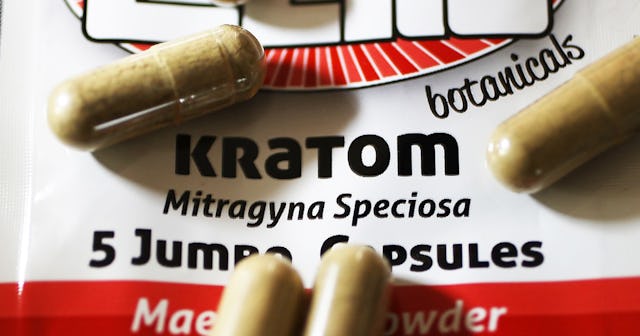Kratom Is Rising In Popularity, But Is It Safe?

You may or may not have heard of of kratom. It’s a funny name for sure. But trust me, it’s popular. According to a recent article in USA Today, between 3 million and 5 million people use kratom nationwide. The pain-relieving compounds in kratom — which is a tropical tree found in Southeast Asia with leaves that contain some of the same chemicals found in opioids — are used by some to treat depression, anxiety, and opioid withdrawal. It can also function as a stimulant. It’s legal, it’s easy to order online, and it can often be found as capsules or in tea at local, all natural stores.
It’s also affordable. A quick Google search reveals that you can buy 50 700-milligram kratom capsules for around $12. That’s about what I spend on Taco Tuesday, and I’m a vegetarian. You can also get seeds to grow your own kratom plants at home for around the same price. Not that I can grow anything at home, but if you are the green thumb type, this is a pretty easy way to go.
But despite its popularity, it’s not 100% regulated, so there are some concerns. Big ones, actually. Although kratom is seen as a natural supplement, users are prone to overuse and abuse. According to a new study published in Clinical Toxicology, phone calls about kratom exposures to poison control centers nationwide skyrocketed by more than 50-fold from 13 in 2011 to 682 in 2017. Kratom also commonly has contaminants like salmonella and E. coli in it.
Joe Raedle/Getty
There is no doctor making recommendations or informing users on how much is too much, or too little, so it all comes down to trial and error. And I will admit, though, as someone who has struggled with anxiety and depression for most of my life, I cannot help but be curious about natural options that have been overlooked by modern medicine. Kratom is intriguing for those struggling with mental illness who are looking for alternative options.
Another alternative option that’s been gaining popularity is microdosing LSD and mushrooms as a means to help overcome stress and anxiety. “Rosie,” a UK mom said, “You don’t feel high, just… better.” In fact, her story reminded me a lot of those who, 10 years ago, discussed the benefits of using marijuana to help treat chronic pain, depression, and anxiety. Now marijuana is legal in many US states and CBD oil is all the rage. It’s easy to see how kratom might falls into this movement.
Kratom’s increasing popularity, as well as the spike in calls to poison control, has garnered the attention of the Federal Drug Enforcement Agency and local drug enforcement. According to The Tribune of Colorado, sellers now must get a license to sell kratom and the state government just put a six-month ban on issuing those licenses.
For now, traditional medicine, is staying away from kratom as a treatment option. If you search for kratom on the Mayo Clinic website, the first page that comes up has a pretty straight forward title: “Kratom: Unsafe and Ineffective.” The article goes on to list a number of side effects that range from dry mouth and weight loss to seizure, coma, and death. Then again, 90% of what I am prescribed for depression and anxiety has a list of side effects as long as my arm. However, the argument made by the Mayo Clinic is that the benefits don’t outweigh the side effects. They state the supplement loses its effectiveness quickly, causing people to take too much, and obviously wind up calling poison control for overdose-like symptoms. There is also the troubling fact that “kratom also adversely affects infant development. When kratom is used during pregnancy, the baby may be born with symptoms of withdrawal that require treatment,” as the Mayo Clinic explains.
LOUIS ANDERSON/Getty
What all of this boils down too is that kratom is a popular but unregulated product with some pretty serious side effects. That being said, as someone who has used many different medications to treat my depression and anxiety only to be left with minimal relief, I’m intrigued by kratom and other similar products. And you know what? That says a lot about what the struggle of living with mental illness and the lack of available relief.
I don’t want to speak for everyone struggling with mental illness, but the fact is, traditionally prescribed medication doesn’t work for everyone and some folks are left looking for alternative solutions, many of which are unregulated and lack adequate research. My hope is that all this attention on kratom, and other similar products, will cause traditional medical providers to start to look outside the box for treatment options. Perhaps with some more testing, fingers crossed, we can increase the array of options available to safely and effectively treat mental illness.
This article was originally published on